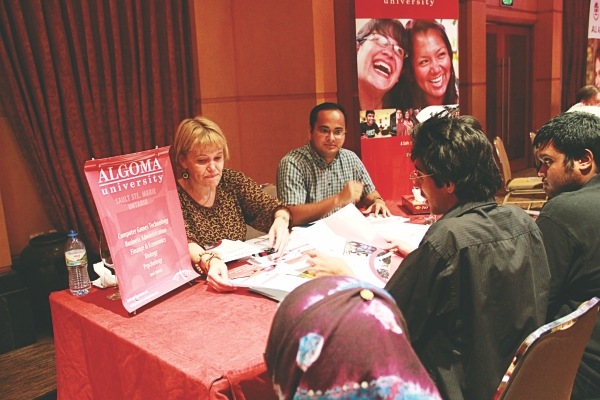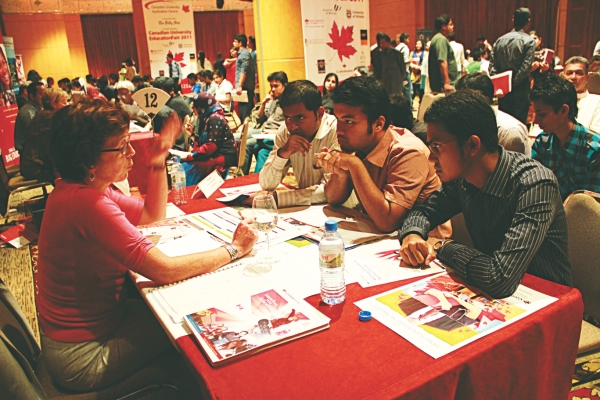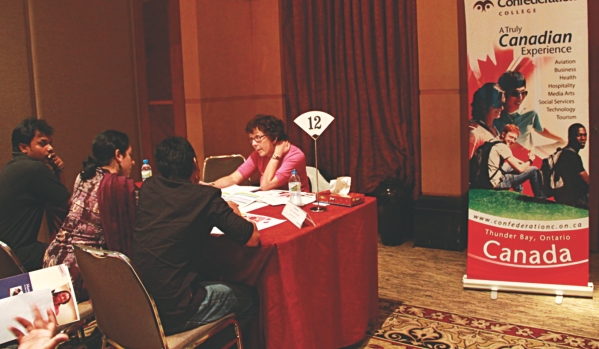Education
To Study in Canada
Naimul Karim
Photos: Kazi Tahsin Agaz Apurbo
An education fair was organised by the Canadian University Application Centre (CUAC) at the Westin Hotel on October 28, 2011. The fair saw representatives from Canadian Universities and Colleges provide information to students yearning to continue their higher studies in Canada.

Canadian University representatives speaking to the students.
“Unlike several other countries, the economy in Canada is still strong. We need people to come to Canada to study and eventually work there,” said Jason Alexander Brennan, representative of the University of Winnipeg. The overall opinion of the representatives of the universities with regard to the job sector in Canada was in contrast to the failing world economy. “A high percentage of our students get employed within 6 months after their graduation,” said Jenny Calder from Saint Mary's University. With the provision of work-permits, ranging from 1 to 3 years, following the completion of undergraduate and graduate programmes, the fair witnessed a large number of students interested in the job sector of the country. “I always wanted to go abroad to work and Canada seems to be a good option since it provides good education and has job opportunities,” said Riyad Hossain, a Business student who plans to get his Masters degree in Business Administration from the Sobey School of Business in Saint Mary's University.

Students asking questions about possible opportunities.
 |
According to the delegates of the universities, students have to excel both at academic and non-academic levels in order to get admission. “The requirements of admission are very diverse; apart from academics, we look at co-curricular activities, work-experience, internships, GMAT and GRE scores and various other aspects,” explained James Dunsdon, Associate Vice President of Student Affairs of CUAC. He further said that the minimum grade required to apply to universities depends upon the reputation of the institution that the student is studying in. Sighting an example he said that the grade required by a student from BUET would be different as compared to the grade required by a student from another engineering institution. However, according to the University Brochures, students are expected to have a minimum 'B' average or an equivalent score for enrolment in a graduate course or an undergraduate course in any discipline. Institutions have also laid down different requirements for the IELTS and TOEFL scores.

With tuition fees ranging in between 12,000 to 16,000 dollars per annum, both for graduate and undergraduate courses, the availability of financial aid and scholarships was a topic that was touched upon by almost every student during their exchanges with the different delegates. “Scholarships are more likely to be available for the undergraduate applicants, however, in order to be eligible for scholarship one must apply as early as possible,” said Dr Nihar Biswas, Associate Dean of Engineering, University of Windsor. He further said that students interested to apply for research can receive funding from their professors if they excel in their academics.

Students also ask regarding credit transfer.
A large section of students also enquired about the transfer of credits from their present university to their desired institution in Canada. “The transferring of credits is an issue that requires a lot of communication between the parent university and the institution that the students want to go to,” said Mr Brennan. “A student needs to make sure that the courses he or she takes will be accepted by the particular university in Canada,” he added. The delegates stated that a student is allowed to transfer a maximum of 60 credits only. Apart from the string of universities, representatives of different Canadian colleges were also present at the fair. “Although colleges give you diplomas and not degrees, we tend to follow a more hands-on approach to prepare students to work in the industry,” explained Susan Hunter, representative of Sault College.
On the whole, the Canadian University Education Fair provided a scope for students to gain a better understanding of the pros and cons of studying in Canada. “Hats off to the people who organised this fair. Events like these manage to give us a lot of information and should take place more often,” said Seefat Mohd Rafique, a Business student from North-South University. Although information regarding universities is readily available in today's digital era, the face-to-face interaction with the delegates of these institutions painted a clearer picture for students aiming to live the Canadian way of life.
|
|
|
